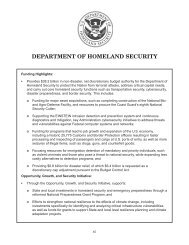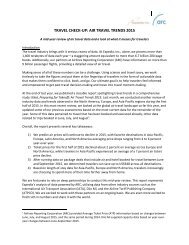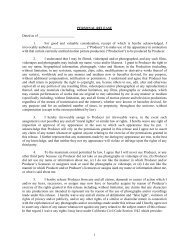A-HRC-13-42
Create successful ePaper yourself
Turn your PDF publications into a flip-book with our unique Google optimized e-Paper software.
A/<strong>HRC</strong>/<strong>13</strong>/<strong>42</strong><br />
page 22<br />
40. A State would thus also be responsible when it was aware of the risk of torture and<br />
ill-treatment, or ought to have been aware of the risk, inherently associated with the<br />
establishment or operation of such a facility or a given transfer to the facility, and did not take<br />
reasonable steps to prevent it; or when the State has received claims that someone had been<br />
subjected to torture or other ill-treatment, or an enforced disappearance, or otherwise received<br />
information suggesting that such acts may have taken place but failed to have the claims<br />
impartially investigated. 40<br />
41. A transferring State could also be internationally responsible under general rules of<br />
attribution of State responsibility for internationally wrongful acts. Recognizing that<br />
internationally wrongful conduct is often the result of the collaboration of more than one State,<br />
rather than one State acting alone - particularly found to be the case in the phenomenon of secret<br />
detention practices of the so called “global war on terror” - the general principles of State<br />
responsibility under international law establish the unlawfulness of the complicity of States in<br />
wrongful acts. 41 In particular, a State that aids or assists another State in the commission of an<br />
internationally wrongful act is internationally responsible if it does so knowing the<br />
circumstances and if the act would have been wrongful if it had been committed by the assisting<br />
State. The real or probable conduct by another State may be decisive in assessing whether the<br />
first State has breached its own international obligations. Article 16 of the Articles on<br />
Responsibility of the Status for Internationally Wrongful Acts, reflecting a rule of customary<br />
international law, <strong>42</strong> provides that:<br />
A State which aids or assists another State in the commission of an internationally<br />
wrongful act by the latter is internationally responsible for doing so if: (a) that State does<br />
so with knowledge of the circumstances of the internationally wrongful act; and (b) the act<br />
would be internationally wrongful if committed by that State.<br />
<strong>42</strong>. Additionally, under the rules of State responsibility, where one State is in “serious breach”<br />
of its obligations under peremptory norms of international law - as would be the case if a State<br />
were to be torturing detainees - other States have a duty to cooperate to bring such a serious<br />
breach of the prohibition against torture to an end, and are required not to give any aid or<br />
assistance to its continuation.<br />
43. Furthermore, the practice of “proxy detention” by a State in circumstances where there is a<br />
risk of torture in the hands of the receiving State could amount to a violation of the State’s<br />
obligation under customary international law on non-refoulement - that is, not to transfer a<br />
person to another State where there are substantial grounds for believing that the person would<br />
40<br />
See footnote 1.<br />
41 See, for example, the rules codified in articles 16, 17, 40 and 41 of the Articles on<br />
Responsibility of States for Internationally Wrongful Acts.<br />
<strong>42</strong><br />
International Court of Justice, Application of the Convention on the Prevention and<br />
Punishment of the Crime of Genocide (Bosnia and Herzegovina v. Serbia and Montenegro),<br />
judgement of 26 February 2007, para. <strong>42</strong>0.
















